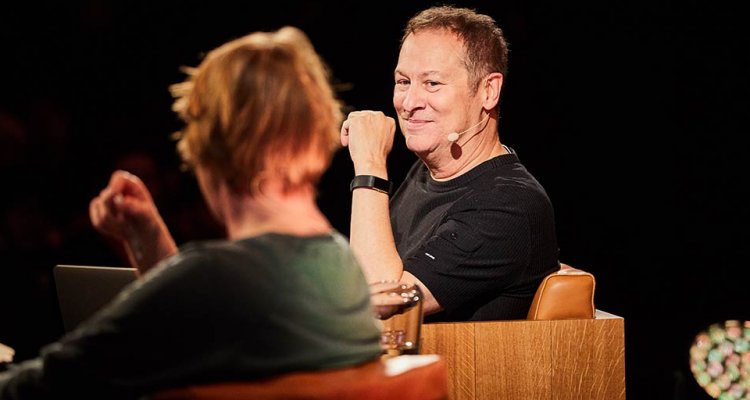Martinez shows the relevant clip from Soderbergh’s ‘Contagion’, the pulsing opening that frames the initial spreading of the virus across people and continents.
“Sounds very Mahler-like! It was the first time in years he had sat at my piano bench, I played the acoustic piano part. He wanted it lower. I lowered the register an octave. He said ‘Hit the piano harder.’ I played it louder. ‘Now hit it harder.’ I burned a lot of calories to make that music sound more like Mahler but all he wanted was for me to hit the piano harder! Sometimes being in the same room together works. My own personality is avoidable. My top priority is to serve the dramatic needs of the film.”
How important are placement and silence to a composer?
“Placement is half the job and I rarely do that. If I’m asked to do that I’m a little intimidated. I grew up with a minimalist aesthetic, working with Soderbergh on his first few films. I think you can damage a film with too much music. In a 90-minute film, 45 minutes is too much. The music feels omnipresent. If it is always saying something it loses its impact. For music to create emphasis, you shouldn’t overuse it. Sometimes it’s should be just short transitions between scenes that tie things together. ‘Sex, Lies, and Videotape’ had 18 minutes of music in a film over 90 minutes long, and it worked fine and when it came in it had more impact.”
“Nowadays I’m given pretty specific direction. If I disagree I have to demonstrate why they should make the music shorter or longer. On occasion, I’ll put music in when they didn’t ask for it because it’s harder to subtract music because they think you’re being lazy and a slacker. They see it as a bonus and that you’re paying attention.”
On the dearth of women composers in cinema, Martinez is stumped and a little dense.
I remember a music festival in Santa Barbara where Robert Kraft had a workshop of 15 composers, all white men. At one point during the Q&A, a woman asked, ‘Why is it that no women are doing film composing? Kraft was stupefied — it felt confrontational and there was a pregnant pause. Then one of the panel suggested, ‘That’s because music is the mating plumage of the male species’, which broke the ice but didn’t offer an explanation. I have a handful of female friends who are composers, but are probably outnumbered 20 or 30 to 1.”
“They often say how hard it is but that could be said of anyone trying to make it. I don’t know if their struggle is unique because they’re women. In the post-production field, I see a fair amount of female picture editors, sound editors, but I rarely see female directors or composers. I don’t see any other composers if I’m hired, of course. Women composers in film are like Himalayan snow leopards: quite rare. I don’t know why.”
We end with a sneak look at Nicolas Winding Refn’s upcoming Amazon TV series, “Too Old To Die Young,” scored by Martinez. The scene is grotesque and politically dubious. It borders on violence. Martinez’s gradual impression of music aids the unease.

